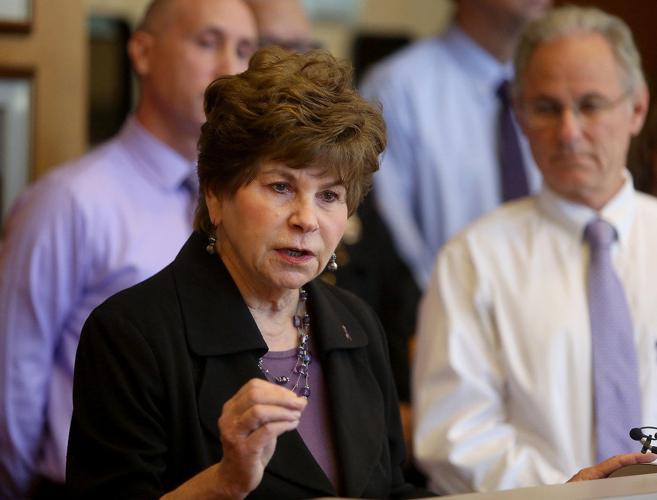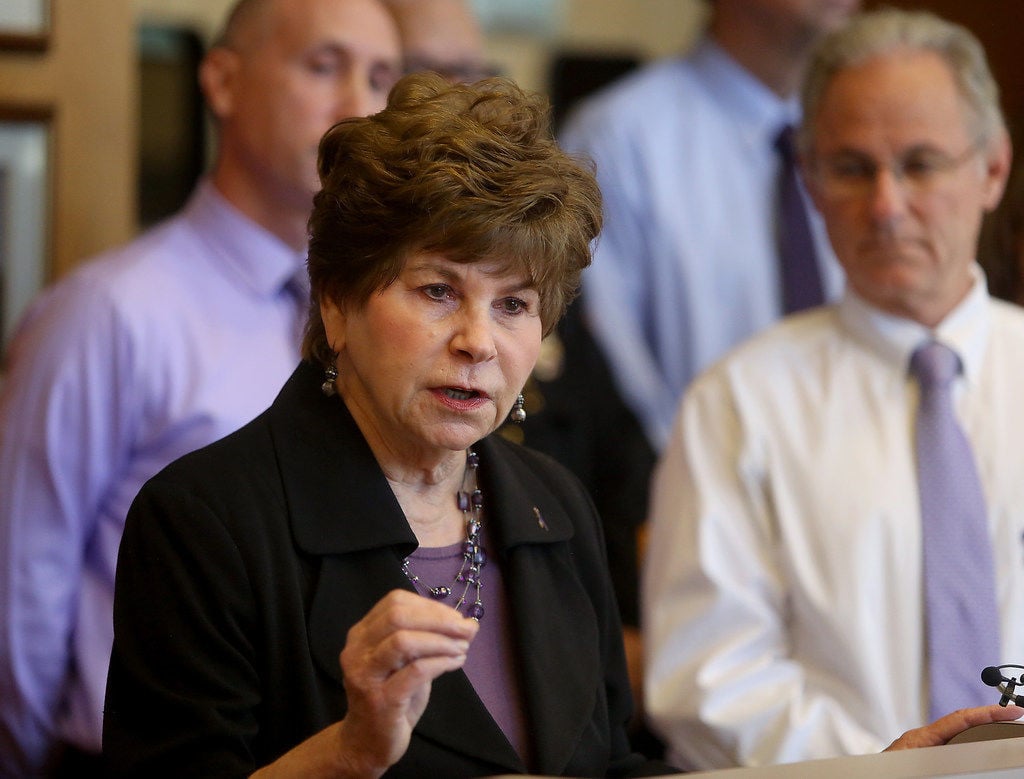In October 2014, a criminal defendant reached an agreement with the Pima County Attorney’s Office and pleaded guilty to two minor drug crimes: solicitation to possess methamphetamine and possession of drug paraphernalia.
The deal for the two Class 6 undesignated offenses also included a $1,000 fine that the plea agreement at least strongly implied was mandatory.
It was to be paid to the Drug and Gang Enforcement Account, which also receives federal support and was established in 1987 to help investigate and prosecute drug offenders, according to a 2017 report from the Arizona Criminal Justice Commission. The commission in turn awards millions of dollars in grants from that fund to state law enforcement agencies, including the county attorney.
Now, three years later, both the county attorney and the Pima County public defender agree the fine in this case — and thousands of cases like it — was not mandatory. Though the county attorney argued it was appropriate, Superior Court Judge Richard Fields ordered any unpaid portion of the fine in this case waived.
“The State believes that the fine was lawfully imposed as a term of the plea agreement even though it was not mandatory,” prosecutor Jacob Lines wrote in response to the public defender’s request to waive the fine. “Under the law governing plea agreements, the parties can legally agree to a fine as part of a plea agreement.”
In recent months, though, the drug fines for hundreds of defendants who accepted comparable pleas have been waived and several hundred more likely will be in the near future, according to information provided by the public defender in response to a records request from the Star.
But that’s just the tip of the iceberg, at least according to estimates provided by the Public Defender’s Office.
In recent years, roughly half of all drug-case defendants in the county ultimately pleaded guilty to what are known as preparatory offenses, such as solicitation or attempts to commit certain drug crimes. The fines mandated by statute for completed drug offenses are not applicable for these charges, according to court documents filed by both the defense and prosecution.
Assuming defendants have pleaded to such charges in similar proportions for several decades, more than 12,000 people may have accepted deals with fines that were mistakenly believed to be mandatory since the late 1980s or early 1990s. The total fines for those cases could be as high as $18.2 million, according to public defender estimates.
Though a number of defendants have already had their fines waived, it is unclear what legal remedy — if any — is available to the vast majority of those who accepted the deals.
One county supervisor cited the fines as an example of “criminalizing poverty.”
Pima County Attorney Barbara LaWall declined an interview request from the Star, deferring questions to Chief Criminal Deputy Tom Weaver.
The fines were not improperly imposed and were “well within the lawful range for felony offenses,” he wrote in an email to the Star. “All plea agreements are entered into and signed by both the prosecution and defense. Pleas must also be approved and accepted by the court.”
Responding to the request to waive fines for the October 2014 drug case, prosecutor Lines also noted that “at no time did the defense attorney involved in this case bring to the state’s or the court’s attention any concern about the fine not being mandatory,” and instead “allowed their client to take the plea.”
“Given the defendant’s argument that they were denied the opportunity to ask the court to not impose the fine, it is possible that the defendant may have a claim of ineffective assistance of counsel to bring before this Court,” Lines argued.
The county, Lines said, did not challenge the request to waive the fine because, in part, it did not want the defendant’s claim of ineffective counsel burdening the court. “In the interests of justice, the state will not object to the reconsideration of the imposition of a fine in this case,” Lines concluded.
While Public Defender Joel Feinman said it’s hard to say what kind of lawsuits might ultimately be filed by affected defendants who may have been improperly fined, he acknowledged to the Star, “We should have caught this much sooner. We didn’t.”
“We’re trying to make amends and correct our mistakes,” he added of the thousands of clients whose pleas included the fines. “We seem to be the only one admitting that we made a mistake and trying to correct it.”
Feinman ran unsuccessfully against LaWall in the 2016 Democratic primary before being appointed public defender by the County Board of Supervisors in April 2017.
The fine issue itself was uncovered by Assistant Public Defender Howard Wine in early 2017, according to Feinman.
No longer mandatory
In the late 1980s, the Legislature approved a number of minimum fines for certain drug crimes, like possession of marijuana, fines for which have a floor of “not less than $750,” according to current statute. However, over the next few years, several court cases established that those fines do not apply to preparatory offenses, according to Wine.
“Somebody should have woken up in the prosecutor’s office and said, ‘wait a minute, the court of appeals is definitely telling us that these fines are not mandatory and they’re not required in the same way as they are for completed offenses,’” Wine said.
As to why it took the Public Defender’s Office nearly three decades to discover the error, Wine suggested part of the explanation could be an apprehension among defense attorneys about provoking the County Attorney’s Office by complaining about a provision in a plea deal. Doing so could make things “much worse” for their defendants.
Waiving unpaid fines is available to defendants currently on probation, but only after their cases have been reviewed by the county attorney, according to the terms of an agreement between the public defender, Superior Court and the county attorney, according to Wine.
Of the 750 cases initially slated for review, 500 defendants were expected to have had their fines waived by Friday, according to information provided by the public defender.
There is the possibility that currently eligible defendants may lose waiver eligibility if they complete probation by the time their case is reviewed, Wine said. Because the waivers apply only to unpaid portions of the imposed fines, it is also possible that potentially eligible defendants are actively making payments that will ultimately be annulled.
“There are people getting off probation every week who, if the prosecutor would have gotten to it timely, would have had their fines waived,” Wine said.
Weaver acknowledged some defendants completed probation during the review, but said it was incumbent on the defendants’ attorneys to notify their clients if their fines could be subject to a waiver. He denied claims the review process is taking longer than it should.
There have also been several cases in which defendants were close to completing probation whose cases were fast-tracked to ensure they did not lose eligibility to have their fines waived, according to Weaver. “We made that happen,” he said.
More waivers possible
In fiscal year 2016, 23 percent of all fines imposed in Pima County Superior Court that year had been paid in full by year’s end, according to figures provided by a public defender employee. That does not include those who had only paid a portion. Wine reviewed a recent month of fine payments for people on probation for preparatory charges and found that substantial payments were being made.
Wine said that in cases where there is a “criminal law remedy,” his office intends to seek waivers for more defendants. However, he estimates the number of additional defendants who might get a waiver is likely less than 2,000, a relatively small portion of the estimated 12,000 believed to have been improperly fined.
“The reason why our confidence is low beyond that is that time deadlines in criminal law are hugely important to the courts,” he said. “And after a certain amount of time expires, no matter how just your claim, the criminal courts are essentially closed.”
County Supervisor Sharon Bronson described the fines as “another instance of criminalizing poverty.”
“These were all minor drug offenses, and this clearly shows a need for oversight in terms of how the county attorney conducts business,” she said.
In response to Bronson’s claim that the fines were “criminalizing poverty,” the County Attorney’s Office said fines are a consequence for criminal behavior and that community service can be used as substitute, according to Weaver.
“It’s true the fines were not mandatory,” Weaver said. Had the issue been raised earlier, he said his office would have simply changed the plea language.
“In any event, the fines themselves were legally permissible, as we have explained in our responses in these motions,” he said.
Because the defendants were all convicted of lesser crimes than they were charged with, all received “substantial benefits” from the plea agreements, he said.
Weaver said the waivers cover only people who are currently on probation, because the court still has jurisdiction over them.
The court no longer has jurisdiction over defendants who were sent to prison or who have already completed probation, so the only way for the court to regain jurisdiction — and for defendants to possibly get their fines returned — is for them to go to court and claim they received ineffective legal representation, among other possible grounds.
Defendants have options to restore the court’s jurisdiction, according to Weaver, who added that any defendants who believe their plea deal may have included an illegal fine is welcome to file a motion in court. “So far, the defense attorneys involved in this have declined to pursue (motions for) relief,” Weaver said.
But people who have paid their fines might be out of luck: “The court indicated that it was unwilling to order refunds,” Weaver said. “It was only willing to order the waiver of unpaid fines.”
In addition, the County Attorney’s Office has maintained from the start that there’s no legal basis for vacating the fines, since they were within the legal range and agreed to by the defendants.
In the 2017 fiscal year, the County Attorney’s Office was awarded $421,915 in grants by the Arizona Criminal Justice Commission, $143,417 of which came from proceeds from state drug fines like those included in plea agreements, according to a 2017 report.
Fines have returned but are much smaller
For several months after Wine’s early 2017 questioning of certain fines, the plea deals offered to defendants charged with preparatory drug offenses by the county attorney did not include fines, Wine said.
Now the deals again include fines, though substantially smaller ones.
The Star obtained a copy of an October plea deal for solicitation to possess meth and possession of drug paraphernalia, the same charges in the October 2014 plea detailed earlier. This time around, the defendant was required to pay $500, not $1,000. Wine said the new fines are typically half the mandatory amount for completed offenses and suggested their inclusion was an effort by the county attorney to “save face.”
Some Superior Court judges are suspending the new fines, Wine said.
But even the smaller fines strike Wine and Feinman as excessive. The vast majority of defendants in these cases are poor and many have histories of drug abuse and addiction, they said.
“It would be nice if (the county attorney) would simply say like we said, that it was a mistake to impose it, and there was no good reason to impose it beyond what the letter of the law required for completed offenders,” Wine said.







